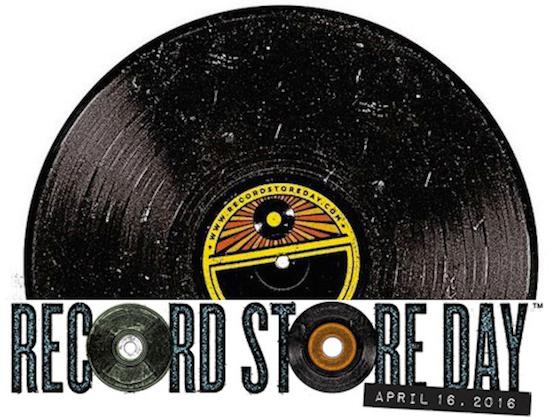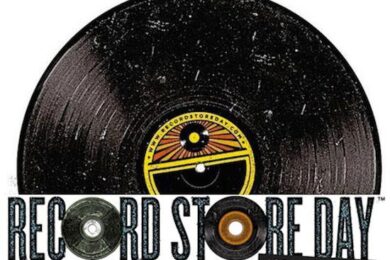Record Store Day has its purpose in the title: a day for Record Stores. Well, OK, so we don’t really have Record Stores here in the UK anymore, but you get the picture. The independent record shop has had a well-documented decline, fitting into the context of the overall decline in retail. But it’s the culture, ethos and – let’s be honest – madness of these places has been missed a little more than some of the other retail establishments. There is no Antique Shop Day or Used Electrical Items Shop day (yet).
The original question in the face of Record Store Extinction was: what should we do, and why should we do it?
The answer was, "Well, how about we lay on a massive promotional exercise to get people to visit their local record shop on one day of the year. It will be a reminder of what they have missed and what they should get back into again. How about we persuade some nice labels and distributors to push out some groovy and cool records for this day to bring people into the shops?” (This is indeed a groovy idea and record shop owners’ thanks to the labels and distributors for doing this in the first place will always be there).
When we rolled this day out some seven years ago it was – and let’s be clear on this – bloody great. The promotional shit worked, and people came poking about my little shop. But we have drifted from this atmosphere of discovery.
Now, RSD is the day for record shops. As in the. Only. One. And what we have now is ‘Vinyl Day’. About one in three of the people who ask me about RSD calls it Vinyl Day (this is not a day for buying flooring).
Traditionally, the big three (Universal, Warner, and Sony) have not exactly championed independent music shops. Rather they have ensured the hegemony of Amazon and helped in a considerable way to hasten the end of the music chain, leaving us with just HMV and the odd Fopp. Yet for a few years now they have really taken to heart the idea that the best way of supporting shops is with exclusive releases on RSD.
It’s for good reason that many want to support us still, we promote and entice, push and cajole an ever reluctant public into buying something new, so we’d like the major labels and distros to respect that. Labels spend tons of money working on big data to produce playlists that may make one song a hit, we have twenty or thirty years’ worth of experience catering to individual music tastes, one by one, day by day.
But the support that has grown from RSD has got to the point where it is killing us (like a fatal industry bear hug). This year there are 550 releases for RSD, in amongst that list is gifts such as Justin Bieber singles and reissuing the very hard to find (and few would say stunning) albums by Status Quo, all attracting the 13 year old Bieber fans (who have no cash) and Taunton’s sole 50 year old Quo fan (who comes in here anyway).
I am not sure which shops these releases are targeting, nor in fact am I sure what the ethos behind RSD is anymore. Most record shops left in the UK are small affairs where turnover is less than £200k. They reside in ancillary retail locations in provincial towns and a significant portion don’t even sell new artists or new music. These guys will not be able to sustain the interest of a Justin Bieber fan. So again I wonder which shops are these releases targeting?
The whole operation is so far removed from the manner in which record shops operate, survive and thrive that it is damaging our reputation. Queues of collectors standing outside stores at some god awful time in the morning so that they can be stripped of cash for overpriced bilge is not exactly promoting the best of what a record shop has to offer (namely affordable and good stock which punters can get their hands on).
Regulars who keep places like mine going get no reward for their loyalty from RSD. The first come first serviced approach freezes them out. If a fan of Radiohead who has spent twenty quid in my shop every month for the past three years wants me to reserve their new special 7” flexidisc especially for them, frankly, I want to. But this puts me at odds with RSD.
The whole event has become a record label promotion opportunity and nothing else. Record shops are merely the vehicle for a quiet time of the year marketing binge. From my point of view, as a record shop owner, RSD is damaging to us in the following ways:
1) The lead up to the day sees a dramatic fall in sales, and the post event effect is similar. Ask around. Do shops’ quarterly figures look any better whenever they take part in RSD? All the ones I know say no. New releases all but come to an end weeks before, and all promotional activities swing behind RSD.
2) The ‘underground’ or ‘niche’ nature of what indie shops provide is being watered down by dross releases with little artistic or cultural merit. It’s not about being a snob, it is about making sure the customer gets value for money. There is enough amazing music out there to change people’s lives without them being dragged into a bogwash of Abba and Status Quo re-issues (all of which sell on original black shit for £1 in my bargain bins).
3) Shops buy RSD stock on a cash-up-front basis, with no possibility of return. Who’s taking the risk here? The labels, the distro, or the shops? The risk is not fairly distributed amongst the players. Do any of these guys know what happens to our cash flow around RSD? I’ve heard of shops having to borrow money to buy stock. I mean for gods sake, how on earth is this helping! The big boys are the worse for this, but for distros like PIAS who continue to operate a no returned stock operation for their entire product, year round, there is little risk on sale from their side. This promotes poor quality. Labels are less likely to sell bilge if they see it all back in the warehouse three months later. Distros and labels like Cargo, SRD, Proper and Discovery operate SOR (Sale Or Return), consignment sales all year round. THIS IS SUPPORT. Expensive and risky on their part, they are working with shops, and this in turn changes the dynamic and it changes the quality (namely in an upward fashion).
4) All this stuff comes out on one day, so in the six month lead up to RSD, the pressing plants are choked full of RSD releases (as investigated by The Quietus here), and as a result the indie labels can’t get anything out in the interim. They’re forcing me to say it… CD is the new vinyl.
5) For many of the huge number of Bowie or Springsteen fans et al ad infinitum. the only option is to go online and pay an insane price for the special release they want from some eBay flipper. Thus encouraging this behaviour further (buying online). Now, as an internet seller I am not against the internet per se, but NOT ON RECORD STORE DAY.
6) Disappointment… perpetual disappointment. Shops will not have multiple copies of every release. As a result a significant number of customers get disappointed and disillusioned. Great…. a promotional event for record shops that leaves customer feeling disappointed and disillusioned. Well that’s just perfect.
RSD should be unremittingly positive for customers. Great deals for all, great music playing. This probably means stepping back from the labels and distros for a day and shops taking control of their event. ERA (the Entertainment Retailers Association, who part organise RSD) does not encourage this. It has its feet in too many camps and thus is unable to gain a proper understanding, nor does there seem to be a willingness to understand.
My idea for labels and artists and RSD? Use this as a day to foster better relations between shops and distros for the long term gain in sales, fans and a social music culture in UK towns. Give us old stock on Sale or Return or even better, on consignment, let us sell it for you on a day when people (everyone) will find a bargain, and understand what ‘flicking through the racks’ meant to people in the 80s.
Not complicated. Find the common ground for all…..
But as it is now, RSD needs to come to an end.



